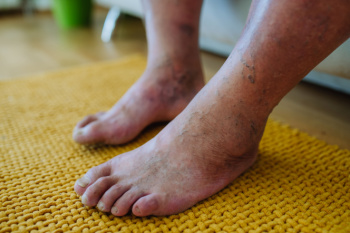
If you have diabetes, taking care of your feet is essential. High blood sugar can damage nerves, causing numbness and reducing blood flow, making it harder for even small cuts or blisters to heal. This increases the risk of serious complications, including infections and ulcers, which can lead to limb loss, if not properly managed. Daily foot care is one of the best ways to prevent problems. Inspect your feet each day for cuts, redness, swelling, or signs of infection. Keep your feet clean, moisturized, and always wear shoes to protect against injury. Regular trimming of toenails, properly fitting footwear, and managing your blood sugar are also key to keeping your feet healthy. Even without symptoms, people with diabetes benefit from regular foot exams. If you are part of this population, it is suggested that you schedule an appointment with a podiatrist for a comprehensive foot evaluation and personalized care plan to help prevent complications.
Diabetic foot care is important in preventing foot ailments such as ulcers. If you are suffering from diabetes or have any other concerns about your feet, contact Matthew McQuaid, DPM from Lake Mendocino Podiatry. Our doctor can provide the care you need to keep you pain-free and on your feet.
Diabetic Foot Care
Diabetes affects millions of people every year. The condition can damage blood vessels in many parts of the body, especially the feet. Because of this, taking care of your feet is essential if you have diabetes, and having a podiatrist help monitor your foot health is highly recommended.
The Importance of Caring for Your Feet
- Routinely inspect your feet for bruises or sores.
- Wear socks that fit your feet comfortably.
- Wear comfortable shoes that provide adequate support.
Patients with diabetes should have their doctor monitor their blood levels, as blood sugar levels play such a huge role in diabetic care. Monitoring these levels on a regular basis is highly advised.
It is always best to inform your healthcare professional of any concerns you may have regarding your feet, especially for diabetic patients. Early treatment and routine foot examinations are keys to maintaining proper health, especially because severe complications can arise if proper treatment is not applied.
If you have any questions please feel free to contact our offices located in Lakeport and Ukiah, CA . We offer the newest diagnostic and treatment technologies for all your foot and ankle needs.

Peripheral neuropathy is a condition that damages the nerves, often in the feet and lower legs. It is common in people with diabetes but can also result from other health issues, such as vitamin deficiencies, chemotherapy, or excessive alcohol use. The damaged nerves can cause numbness, tingling, burning, or sharp pain. Some people lose feeling in their feet, making it hard to notice cuts, blisters, or injuries. Without proper care, these small issues can lead to infections or serious complications. People with peripheral neuropathy may also have trouble with balance and walking because they cannot feel the ground beneath their feet. Daily foot checks, supportive footwear, and regular visits to a podiatrist are important for preventing problems. If you notice unusual sensations or numbness in your feet, it is suggested that you see a podiatrist for a proper diagnosis and appropriate care.
Neuropathy
Neuropathy can be a potentially serious condition, especially if it is left undiagnosed. If you have any concerns that you may be experiencing nerve loss in your feet, consult with Matthew McQuaid, DPM from Lake Mendocino Podiatry. Our doctor will assess your condition and provide you with quality foot and ankle treatment for neuropathy.
What Is Neuropathy?
Neuropathy is a condition that leads to damage to the nerves in the body. Peripheral neuropathy, or neuropathy that affects your peripheral nervous system, usually occurs in the feet. Neuropathy can be triggered by a number of different causes. Such causes include diabetes, infections, cancers, disorders, and toxic substances.
Symptoms of Neuropathy Include:
- Numbness
- Sensation loss
- Prickling and tingling sensations
- Throbbing, freezing, burning pains
- Muscle weakness
Those with diabetes are at serious risk due to being unable to feel an ulcer on their feet. Diabetics usually also suffer from poor blood circulation. This can lead to the wound not healing, infections occurring, and the limb may have to be amputated.
Treatment
To treat neuropathy in the foot, podiatrists will first diagnose the cause of the neuropathy. Figuring out the underlying cause of the neuropathy will allow the podiatrist to prescribe the best treatment, whether it be caused by diabetes, toxic substance exposure, infection, etc. If the nerve has not died, then it’s possible that sensation may be able to return to the foot.
Pain medication may be issued for pain. Electrical nerve stimulation can be used to stimulate nerves. If the neuropathy is caused from pressure on the nerves, then surgery may be necessary.
If you have any questions, please feel free to contact our offices located in Lakeport and Ukiah, CA . We offer the newest diagnostic and treatment technologies for all your foot care needs.

Gait disorders in the elderly significantly affect the feet, leading to discomfort, instability, and a higher risk of falls. These conditions often result from musculoskeletal issues, neurological disorders, or chronic diseases, such as arthritis and diabetes. Weakness in the foot muscles, joint stiffness, and loss of sensation contribute to unsteady movement, increasing the likelihood of injuries. Pain and deformities like bunions or hammertoes further disrupt balance, making walking difficult. Reduced mobility leads to a loss of freedom and independence, affecting mental well-being and overall quality of life. Fear of falling may cause seniors to limit their activities, resulting in muscle weakness and further instability. If you are elderly or caring for an elderly individual and notice a change in the feet or walking patterns, it is suggested that you consult a podiatrist who can offer corrective treatment and proper foot health guidance.
Proper foot care is something many older adults forget to consider. If you have any concerns about your feet and ankles, contact Matthew McQuaid, DPM from Lake Mendocino Podiatry. Our doctor can provide the care you need to keep you pain-free and on your feet.
The Elderly and Their Feet
As we age we start to notice many changes in our body, but the elder population may not notice them right away. Medical conditions may prevent the elderly to take notice of their foot health right away. Poor vision is a lead contributor to not taking action for the elderly.
Common Conditions
- Neuropathy – can reduce feeling in the feet and can hide many life-threatening medical conditions.
- Reduced flexibility – prevents the ability of proper toenail trimming, and foot cleaning. If left untreated, it may lead to further medical issues.
- Foot sores – amongst the older population can be serious before they are discovered. Some of the problematic conditions they may face are:
- Gouging toenails affecting nearby toe
- Shoes that don’t fit properly
- Pressure sores
- Loss of circulation in legs & feet
- Edema & swelling of feet and ankles
Susceptible Infections
Diabetes and poor circulation can cause general loss of sensitivity over the years, turning a simple cut into a serious issue.
If you have any questions please feel free to contact our offices located in Lakeport and Ukiah, CA . We offer the newest diagnostic and treatment technologies for all your foot and ankle needs.

